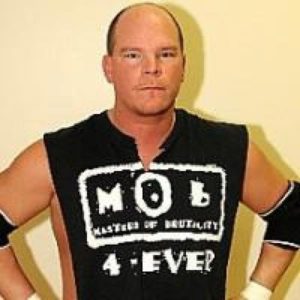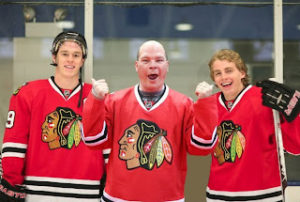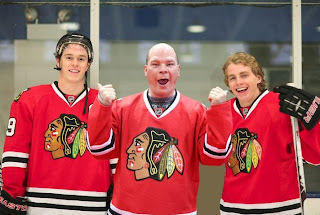After I interviewed Windy City Wrestling co-founder Sam DeCero in 1991 in Chicago, Sam brought over a few of his trainees to talk to me. Trevor Blanchard was introduced to me as a “bad guy,” and he sat down for this interview with some wariness. I guess the bad guy attitude was inevitable if you were related to former Horseman Tully Blanchard.
Blanchard: I’m originally from San Antonio, but I moved here to Chicago when I was younger. I got involved through a cousin, a third or fourth cousin by the name of Tully Blanchard. He used to wrestle in the NWA. The last time I talked to him was just before I started, about a year ago. I told him that I was starting with Sam [DeCero]. That’s pretty much it. I’ve been in it a little over a year, working to get the big bucks and the titles. It’s been something I’ve wanted to do. I went, when I was younger, to the Amphitheater [a wrestling arena in Chicago]. About the age of 12 was when I finally decided I wanted to do it.
Tully, besides being a relation, has helped me a lot. Not just with physical things, but with mental things. Because it is a strain traveling from town to town, four- and five-hour trips, whether it’s by yourself or if you bring a lady friend or whoever. As far as other idols, I’d say Ric Flair is another, Arn Anderson, Curt Hennig, Bobby Eaton.
How am I “bad?” I don’t like signing autographs. I just go to the arena. I go in the locker room, I put my boots, my kneepads, my trunks, my tape on. Then I go in there to win. I don’t go there to sign autographs, I don’t go to take pictures. Most of the time I don’t talk to [the fans]. If they say, “You had a good match,” I’ll nod my head. I won’t talk to them. I might give them some eye contact, but as far as putting up with them, I don’t really care to. They tend to pull on you, to tug on you for autographs. If you give one, you’re gonna have to give them all. The one soft spot is, I have signed a couple to kids in wheelchairs. That’s my soft spot. Because a couple of friends of mine, their kids aren’t as fortunate as others. So that’s where I draw the line. If they can walk and tug on me, that’s where I draw the line. But if there’s somebody that’s hurting, a kid that’s hurting, then I’ll stop. But there’s only a couple of times where that’s happened.
If we’re here in Illinois, in Chicago–I remember an instance. I don’t like the Bulls. Now they won the championship, fine. I’m mostly a Boston fan. So when the Bulls won, it was right before we had a match in Hillside [Illinois], the Saturday after they won it. And I told [the crowd], “I’m gonna beat this guy like the Lakers should have beat the Bulls.” If we go back to some places … where they know of me, then they’ll start on me first.
There’s not enough independent [wrestling] for the smaller towns. I’ve noticed, especially with the NWA/World Championship Wrestling, even their pay-per-views, they don’t get a lot of big crowds like they did in the mid-80s, like ‘85, ‘86, ‘87. In ‘87 it started going down for them. Because they don’t go to the small towns enough. It’s amazing when you go to a smaller town, nine times out of ten it’s sold out because wrestling doesn’t get there. They see it on cable, and even though they may not know any of us from TV–”Hey, wrestling’s going to be here Saturday!” There have been a couple of instances where we haven’t had a real good crowd, but usually something else has been going on besides that. But as far as going to the smaller towns, that’s a big thing. Because if you can do well on them, then if you go back there, then they’ll go and see you. Or they’ll go see the organization. I’ve noticed lately that World Championship Wrestling has been going to somewhat smaller towns, but the WWF isn’t. The WWF just sticks to New York, or the Rosemont Horizon here in Chicago, you know, some of the bigger arenas that can hold more than five thousand people.

In five years I hope to be a little bigger as far as size and weight. I want to get up to about 220, 240–without steroids–and hopefully be doing it full-time. Any issue the media gets hold of, they blow it out of proportion. My personal thoughts on steroids is I’m against them. I’ve seen what it’s done to Lyle Alzado. Sixteen or seventeen years of taking them and he’s got brain cancer and he’s probably not going to be around much more than two years. I know you can usually tell who takes them in the wrestling business, but as far as me taking them, I would probably never. About the only thing bad that I may do is eat fried food once in a while.
I want to travel city to city, be in a different city every night. Right now I’m just getting started, and you can’t go full-time without having some experience underneath your belt. Five years from now, like I said, I hope to be doing it full-time. It’s something I’ve wanted to do since I was twelve. You know, I’ve just gone by steps. I came in here, talked to Mike and Sam, and–not to be rude toward them or the people that come in here, but most of the time when someone comes in and says, “I want to become a wrestler,” they have to take it with a grain of salt. Until they come in here and put down a deposit, you can’t take them seriously. Sometimes three or four guys will come in here, and not one of them will come back.

It’s just something that I’ve wanted to do. Some kids grew up wanting to be a police officer, and they go through the test and everything. Me, it’s just about something that I wanted to do. My parents aren’t real happy about it. They’re starting to cope with it now. The initial reaction was that they weren’t real happy. The first match they saw me in, I wound up getting hit with a chair, and they were sitting in the front row. I heard it from my brother. My mother was in tears. They’re coping. My dad doesn’t show it as much, but my mother does. [It’s like,] if you were doing something that your mother didn’t like, and she went with it because she knew you wanted to do it. They’re coping with it a lot more now. They’ve seen the improvement. They don’t go to all of [my matches], but they go to most of them, and they have seen an improvement within the last year. Actually, within the last four or five months.
I’m sure you’ve heard stories about groupies, or “arena rats.” If something [like that] should come along the way, and if she wants to, shall we say, go on a ride with me and go from city to city, then fine. But that’s something that’s gonna have to be dealt with by her. It’s something that she’ll have to adapt to. I’m not going to change anything for her. I date, but not too much. If I’m not at the gym or here, then I’m usually working. That takes a lot out of my time. If I’m not working or working out, then I’m usually at home, relaxing.
Thoughts from 2023: Trevor Blanchard went on to hold the Windy City Wrestling Lightweight title for a short time in 1993, wrestled for World Championship Wrestling in 1998, and continued to wrestle as recently as 2022 for independent promotions.

